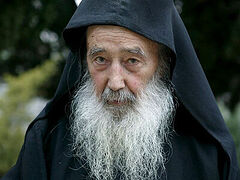In order to encounter God, we must be sincere in prayer. Some time ago I wrote the following: “Know that the road we travel in our spiritual life in order to encounter God and come to know Him is not straight, but winding.” In other words, there will be times in your life when you’re moved, and there will be times when you spiritually dry up. There will be times when you’re happy to go to the Divine Liturgy, but there will also be times when you’re reluctant to go to church. If you ask priests, they’ll tell you the same thing, that they have times where they weep during the Divine Liturgy, moments of deep spiritual emotion due to the presence of the Holy Spirit, and times when they don’t feel it, but only weariness. These changes are natural, because we’re mutable: You wake up happy and in the evening you’re sad; in the morning you’re happy, but by noon you’re in a bad mood. That’s how we are. It’s the same in prayer: There are times when we don’t really want to pray. What should we do? Should we give up praying? No. The first thing God requires of us is that we be sincere.
There’s a wonderful case that happened with Elder Sophrony. A woman came to his monastery and told him:
“You speak well in your talks, Father, about how we must pray and communicate with God. But I have one sin. I have some disagreements with God, and I can’t tell Him, ‘Thank you.’”
Pay attention to this woman’s problem. She says:
“I can’t say, ‘Lord, thank you,’ because I have a disagreement with God at that moment.”
And this is how Elder Sophrony answered her:
“Don’t be afraid to ask God for something; don’t be afraid to be sincere with God. Tell Him how you feel: ‘Lord, I don’t agree with you about this, or I have a complaint.’”
Look at the difference between a saint and those who give people advice that fills them with a feeling of guilt and destroys their relationship with God.
Many say:
“I’m in pain and grumbling.”
Don’t be afraid! Tell God about it; turn this problem of yours into a relationship with God.
Or mothers who have lost their children say they have no desire to pray; they’re overwhelmed with anger. Anger is the main stage of grief. I mean any grief, including the grief of love, that is, the grief from parting. Therefore, in the spiritual life, man experiences anger towards God:
“You took my baby!”
Or something else. These are extreme psychological and spiritual states. And how does the Elder react to them? He says:
“No problem—express your anger before God!”
 Archimandrite Sophrony (Sakharov)
Archimandrite Sophrony (Sakharov)
God is not a pitiful and malicious man—it’s we who imagine Him to be that way, as if He were someone who could hold a grudge against a mother because she complained to Him.
I remember how it used to be in villages. When a woman lost a child and wanted to express her grief and say something about it, her relatives would slap her in the face and say:
“Stop it! Don’t say anything! Don’t you fear God?! Aren’t you ashamed?! God will punish you!”
They wouldn’t let her express her feelings until this expression of feelings was sensible. If you don’t express the anger you’re feeling, and everything you’re feeling, it won’t be of any benefit to you. So as not to quote psychologists who explain this very well, let’s look at what St. Porphyrios says about it: “Feelings that aren’t expressed become diseases.”
One of our main problems today is that spouses don’t regularly communicate with each other. The husband is at work all day, he comes home late, the wife is waiting to talk with him, and he says:
“I was very busy at work today and I’m very tired!”
After dinner, he tells his wife:
“Let’s talk tomorrow.”
And he goes to sleep. There’s no communication between spouses. It’s a huge problem because if your wife can’t talk with you, she’ll find someone else she can talk with, because the need for communication and self-expression can’t be side-stepped or stifled.
When we find ourselves, we’ll be honest with God and we’ll turn everything, including our problems, into a relationship with God. Then our next step will be to understand—Who is the God Whom we’re addressing. Look, it’s not enough for someone to say he’s Orthodox and believes in God. Which Christ do you believe in? Which God do you believe in? Because often we say we believe in the Orthodox God, but in fact this god is anything but the Orthodox God. This happens when from an early age you form an idea of God as vengeful, and if you don’t fulfill His will then He’ll punish you. IIf you sin then He can punish you, He can send you a disease, maybe kill you on the highway, maybe set fire to your tires, maybe let your child get cancer, and so on.
This is what most people believe, isn’t it? That’s why they say:
“The Lord let one man get cancer and another died in a car accident—God allowed all of this.”
This is one side. The other, similar side, is the idea that God loves me when I’m good. Isn’t that what we’re taught?
“If you eat your breakfast, the Theotokos will love you, but if you don’t eat it, she’ll cut your tongue out!”
One day I was walking down the street and I saw a woman I know, feeding her child. I went over to pat the boy’s head, and she said:
“Eat, eat, little boy, or Father will eat you!”
This child is from our parish, and he still can’t get used to me. I try to tell him that I don’t eat people, and every time I try to explain it to him, he hides.I won’t even mention the offensive words he said to me last time. I pretended not to hear him.
Unfortunately, there are also clerics who cultivate such thinking in people. So if you’re brought up with ideas like this, you’ll form a distorted concept of God. How will you encounter the living and true God if He isn’t the way you imagine Him to be? It’s like you have the wrong address and phone number. You’ll never come to God, because you believe in a “God” who is quite unlike the real, living, and true God, Who loves you.
Do you know how many people are tormented by a sense of guilt and say:
“Father, does God love me now, when I’m so sinful, when I’ve done so much evil?”
Do you know how many people are tormented by such thoughts? Many people. These are very deep layers that aren’t so easily removed. It requires much work from the spiritual father for the soul to regain its balance.
Metropolitan Anthony of Sourozh spoke about how a man met him, asked him for Confession, and said: “I’ve been praying for twenty-five years now and I don’t feel God at all!”
 Metropolitan Anthony of Sourozh
Metropolitan Anthony of Sourozh
Metropolitan Anthony said to him:
“Tell me about your favorite passage from the Gospel, please.”
“I really like the part with the woman caught in adultery, when everyone comes, condemns her, and starts throwing rocks at her, but Christ says, ‘Let he who is without sin throw the first stone,’ and all her accusers leave. And then Christ tells her: Neither do I condemn thee: go, and sin no more (Jn. 8:11).”
Metropolitan Anthony said:
“Tell me, if you were there now, whose side would you be on—on Christ’s side, on the side of the woman, or on the side of those with rocks in their hands?”
And the man told the Metropolitan:
“To be honest, Vladyka, I wouldn’t have put down my rock so easily.”
Do you know what that means? That this man is very far from Christ. In essence, he wants to see a Christ Who throws stones, like the majority of us want a Most Holy Theotokos who cuts off hands, cuts out tongues, or “stones” people—but that wouldn’t be the Most Holy Theotokos. It would be the worst of persons. That is, if the Most Holy Theotokos cuts off the hands of someone who steals, understand that this is not a virtue. Pay attention to the lives of the saints. Thieves went to rob St. Myron. He went into his cell, and seeing thieves there, he said to them:
“My children, don’t tire yourselves, I’ll help you!”
That’s what a saint is like. If the Most Holy Theotokos cuts off people’s hands, blinds them, and so on, know that this is not the Most Holy Theotokos. She’s the Most Holy Theotokos precisely because she is the face of holiness and purity, imitating Christ Who forgives everyone on the Cross.
The question is, if I’m like this, then what god will I meet? How often we wish that the Lord would punish someone who annoys us or causes us harm:
“God will repay him!”
Don’t we say that? First, it’s a curse; second, it’s revenge; third, it’s a psychological projection of ourselves, our vindictiveness, onto God.
We ask God to harm another. Don’t we secretly exult when something bad happens to our mother-in-law or our neighbor? We say:
“Oh, serves her right! Look how she’s paying for her sins!”
We think the Lord punished her because we’re always right. We haven’t the slightest doubt that we could be guilty of anything. The other person is always to blame, so he’ll be punished.
The next step is to always tell God the truth in our prayers. Prayer is the exposure of our “I.” In prayer, I don’t want to show how much higher I am, how good I am, as we unfortunately do in Confession.
We’re all “sinless people.” I created a “school for sinless people” in my city [laughter in the audience]. People from this school come to me and say:
“Everything’s fine. I haven’t sinned in any way!”
“You don’t have any sins?”
“Absolutely no sins, Father!”
Some people, not just one, two, or three, even say:
“Father, there’s no one better than me!”
To which I say:
“I see.”
Once I asked one person:
“Tell me, do you pray at all?”
“How could I not pray?! Every morning, when I stand before the mirror, I say to myself: ‘You won’t find someone as good as you in the whole world!’”
These are real stories; I’m not exaggerating.
Do you remember the case with Fr. Epiphanios (Theodoropoulos), when a woman went to him for Confession and spent a whole hour reproaching her daughter-in-law?:
“My daughter-in-law has such a sharp tongue! My daughter-in-law has this flaw, and this and that sin! My daughter-in-law has this and that passion…”
 Archimandrite Epiphanios (Theodoropoulos)
Archimandrite Epiphanios (Theodoropoulos)
Then she stood up and said to him:
“Father, read the prayer of absolution over me.”
“No, I’m not going to read it. First call your daughter-in-law for me to read the prayer over her, because you didn’t confess your sins—you only confessed the sins of your daughter-in-law!”
Not to mention that in the village where I live, Confession is a hospital bulletin. People come and say:
“What can l tell you, Father? Ah, what can I do? My bones hurt! My back hurts! I have varicose veins!”
Be blessed! They even show me the ointments they use. Even standing in line waiting for Confession, they exchange medicines with each other. If, for example, one woman found some good blood pressure medicine, she shares it with another parishioner.
You’re laughing now, but this is our life. The same thing happens with prayer. However, prayer isn’t boasting before God, but exposing our own weakness, shortcomings, and torments. With its help we say:
“My God, I want to be with You; I need You to come into my life; I want to feel Your presence, Your blessing, Your grace; I want to feel Your living, active presence!”
Then I name my passions and infirmities in prayer—not with any special or complicated expressions, but speaking simply and sincerely.
To be continued…







